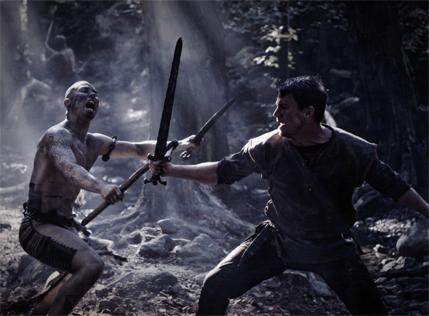The Eagle, based on Rosemary Sutcliff’s children’s adventure novel The Eagle of the Ninth (retitled, presumably, so non-Classics scholars would know it wasn’t about golf), tells the story of how Roman soldier Marcus Flavius Aquila (Channing Tatum) redeems his father’s honor by recovering the standard of his father’s legion. Since that legion was lost in Scotland—which, we are frequently reminded, is the end of the known world—Marcus has quite the quest on his hands, which he boldly undertakes with only one companion, his slave Esca (Jamie Bell).
Director Kevin MacDonald clearly wants The Eagle to be more than a standard sword-and-sandal picture, but these ambitions are frequently thwarted by Jeremy Brock’s script, which apes Gladiator’s structure so closely that until Marcus and Esca get to Hadrian’s Wall, it’s practically a remake. From there, there is the minor logical problem of how two guys on horses—one of whom is a hated enemy who’d be killed on sight the second he opens up his mouth and starts speaking Latin—can find one golden eagle that had been lost twenty years before in a big wide-open country. Conveniently, Esca knows more than he’s letting on, which makes the quest easier. This, though, makes the fact that he just happened to be trying to commit suicide in a gladiator fight that Marcus just happened to have been taken to by Donald Sutherland, and that Marcus just happened to convince the crowd to spare Esca’s life with a thumbs-up, and that it just happened to work into one of the greatest chains of coincidences yet captured in cinema.
The script also skips a couple steps in the developing relationship between Marcus and Esca. After the above-mentioned gladiator fight, Donald Sutherland (Marcus’s uncle) buys Esca to be Marcus’s slave. Marcus doesn’t want a slave and Esca hates Rome and everything it stands for since Roman soldiers were responsible for his parents’ deaths. But he is beholden to Marcus now for having spared his life; a source of bitterness, as he was trying to get himself killed in the gladiator fight. So far, so good; in the right hands all those contradictory impulses could potentially lead to a nice, nuanced journey to mutual respect based on a shared belief in honor and so forth. This is where they ultimately end up at the end of the picture, but the journey is a bit muddy, as are Esca’s motivations: it’s all fine and good that he isn’t a devious revenge seeker, but we’re never shown exactly what it is about Marcus that makes Esca decide he’s okay: Marcus is certainly a brave soldier, but he’s a bit cold-blooded about killing and extremely condescending, until all of a sudden he isn’t and they’re best buddies.
Aside from the writing, the rest of the movie is executed quite well. Academy Award winning (for Slumdog Millionaire) cinematographer Anthony Dod Mantle does a nice job selling the opening scenes of Roman garrison life as credible with some subtly-executed hand-held camerawork. It’s done well enough that it’s not that distracting, jittery grab-some-Dramamine stuff, it’s actual cinema-verite style. Then, by contrast, the bits in Scotland are lit and shot like it’s Middle-earth; this is cinema technique mirroring Marcus’ journey, as he’s at home amidst Roman culture, and the frontier is strange and magically sinister.
Audiences who are not excitedly wondering what exposure Mantle was using to get the glowy sunset shot of Channing Tatum and Jamie Bell on horseback, though, may get hung up on historical inaccuracies, like the Scottish people speaking Gaelic a few centuries before anyone actually did, or that the “seal people” look like they’re wearing Prada (which I didn’t mind at all).
Ultimately one has to decide whether The Eagle is a good enough movie to bother poking holes in. I think it’s a movie about an interesting subject, made in a sincere attempt to make a good movie, rather than being product of an assembly line. This is the reason why I hesitate to bash Channing Tatum’s acting too much, because he’s trying very hard, and with the exception of one mildly ridiculous scene where he gets all emotional on Donald Sutherland he doesn’t exceed the modest boundaries of his talent. The role doesn’t require him to do much other than look intense and cut people up with swords every half hour or so, and he does that well. Jamie Bell does a nice job as Esca considering his motivation is so cloudy. Donald Sutherland basically plays Donald Sutherland in a toga, which is to say he’s fun. And, once our heroes get to Scotland, they run into a wild-haired, American-accented Mark Strong, which proved the thesis I’d developed in some of the earlier scenes where all the Romans have American accents: all the Romans having American accents means we have ourselves a parallel between Roman and American imperial ambitions, and the side effects thereof. This is another reason why Channing Tatum does a secretly good job in this movie by not doing much: in merely existing, he’s extremely American.
The Eagle doesn’t quite live up to its ambitions, but is neither good or bad enough to get truly excited about. It’s not as dumb as its trailers make it out to be, though its slowish pace and relatively sparse action will disappoint those looking for an action movie. Once it’s available on DVD it might make for a relatively interesting evening, but it can probably wait until then.
Danny Bowes is a playwright, filmmaker and blogger. He is also a contributor to nytheatre.com and Premiere.com.










